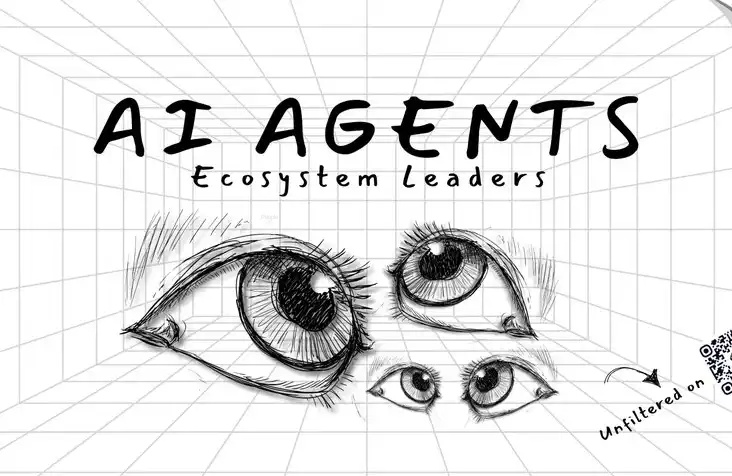Where did people who left the cryptocurrency industry go?
Original Title: "Where Did People Who Left the Cryptocurrency Industry Go?"
Original Source: TechFlow
In the world of cryptocurrency, people come and go. Have you ever wondered where those who left the industry went?
With this question in mind, we interviewed numerous former industry professionals and received a variety of answers: studying abroad, getting married and having children, lying flat, starting an AI business, selling insurance, technology agriculture...
Leaving here does not mean not holding cryptocurrency assets, but not working in the cryptocurrency industry. Some people earn enough to retire and lay low; some leave due to the bear market; some are still unemployed...
When the gears of the encryption cycle start turning, everyone is swept forward involuntarily and cannot control their own fate.
What are the veterans in the cryptocurrency industry doing?
In 2011, a significant event that impacted the history of Chinese cryptocurrency occurred with the establishment of the "BitBeat" community.
It is well known in the industry that there are two founders of 8btc, Chang Jia and QQagent (Wu Jihan), but there is actually another founder - financial writer Lao Duan.
In 2011, Lao Duan wrote several articles related to Bitcoin, including "What can increase in value by 3000 times in one year" and "Bitcoin: Great innovation or giant bubble". In July 2012, Lao Duan established the Bitcoin fund "Lao Duan Bitcoin No.1", which was also the first Bitcoin fund in China.
A few months later, the Cyprus banking crisis broke out. Bitcoin skyrocketed more than 10 times in just 8 months. However, the surge actually caused great "psychological pressure" for the veteran. Under the pressure of cashing out, in April 2013, the veteran chose to liquidate the Bitcoin fund ahead of schedule, believing that the rise of Bitcoin had come to an end.
In November 2013, after the liquidation of the Bitcoin fund by Lao Duan for 5 months, Bitcoin unexpectedly surged again, while Lao Duan, who had "missed the boat", gradually transformed from a Bitcoin evangelist to a Bitcoin critic.
"The biggest value of Bitcoin currently is fulfilling the fantasy of overnight wealth for Chinese people."
At this point, Lao Duan parted ways with the world of Bitcoin and later rooted himself in the stock market circle, becoming a stock commentator and publishing books such as "Investment Magic Book", "Positive Energy Investment Studies", and "Actually You Still Don't Understand Women".

In March 2021, Lao Duan once again mentioned "Bitcoin".
Lao Duan said that at his peak, he owned four-digit Bitcoin, which is now worth billions of RMB. However, most of it was sold after earning dozens of times, but there are still three-digit "leftovers" remaining. The problem is that these Bitcoins are all in a bankrupt exchange called Mt. Gox.
Same as before, but after Wu Jihan and Lao Duan left, Chang Ha found new partners: Song Huanping, Chen Yurong, and Lang Yu.
Song Huanping's former title was "Co-founder of Babit", and now his identity tag appearing in the media is the founder of Happy Tiger Capital, the first angel investor in the catering industry. He has invested in Lele Tea, Chen Xianggui, Hutouju, Moli Milk Tea, and Hu Zi Da Chu.

In 2013, Song Huanping learned about Bitcoin in a QQ group. Later, through a friend's introduction, he met Chang Han and joined Babite to participate in the commercialization process. However, this journey only lasted for 4 months.
In early 2015, with the first bucket of money earned from the cryptocurrency industry, Song Huanping chose to leave the industry and turned to the investment industry, targeting the catering industry, and established Joy Tiger Capital.
In 2017, during a media interview, Song Huanping expressed some dissatisfaction with the cryptocurrency industry, even saying that he was "a little sad":
"A surge, followed by a new wave of attention, then quickly cooled down, waiting for the next time to break through a price that was considered crazy before, and then attract an even greater wave of attention."
"Bitcoin is a good thing, but the cryptocurrency industry is too dirty."
Since the birth of Bitcoin, it has changed the fate of many grassroots people in more than ten years. The old timers in the currency circle have all "retired" and faded out of public view.
A "veteran" who entered the Bitcoin community in 2013 told DeepTechFlow that the old-timers he knows in the coin circle either go abroad or return to their families, taking care of their children every day. Some have also become obsessed with "immortality" and invested in the peptide-related industry.
Once, Li Xiaolai, who was known as the "Bitcoin tycoon", was regarded as the spokesperson of the cryptocurrency industry, until he gradually faded out of the industry after the recording incident in 2018. Aside from continuing to write books, the most important thing for Li Xiaolai, who left the cryptocurrency industry, is that he has "had a bunch of children" and has become a father. Now, Li Xiaolai has a new identity as an educator.
After 2022, Li Xiaolai launched the "Family Growth Annual Community" (1999/year), and in 2023, he released a new course "Li Xiaolai Talks about Family Education in the AI Era" on Dedao, which received widespread praise.

Flat miners
Once upon a time, miners were regarded as standing at the top of the cryptocurrency food chain. With a "ban", Bitcoin mining completely broke up with China. So where did the miners who no longer mine go?
The former miners interviewed told DeepTechFlow that the mining community is also extremely complex internally, with different decisions and ideas between big miners and small miners.
Some large miners choose to take their mining machines and physically go overseas to continue mining, while others choose to transform into AI and provide computing power support for other enterprises.
Most of the interviewees mentioned the same words - "lying flat", having savings, and not wanting to work, so they eat, drink, play, travel, and pursue wellness.
Shrimp farming, other seafood, orchards... she also enjoys them.

After conducting research and careful consideration, Liangyou believes that agriculture is a relatively stable and long-term business in the current economic environment in China. In addition to investing in technology agriculture, Liangyou will also invest in other physical industries.
Former miners like Liangyou still pay attention to the cryptocurrency market even though they are no longer "mining". They share a common goal - to accumulate coins.
After the Entrepreneur Leaves
Before entering the cryptocurrency industry, Saul had been investing in the internet sector.
In the summer of 2021, the emergence of STEPN caught Saul's attention, indicating that blockchain games may be a direction for the future development of the gaming industry.
This time, he didn't directly invest in a company, but chose to start his own business. Compared to young entrepreneurs who started in the cryptocurrency industry from the beginning, he believes his advantage lies in having gone through a complete cycle, with more product and user experience.
Therefore, Saul launched a similar movement to earn projects with reference to STEPN and received investments from multiple industry VCs.
During the hot cycle of "x-to-earn", Saul's project gained widespread attention in the early stages through various operational activities and collaborations with some public chain ecosystems. The NFT props sales were impressive, but like a fleeting firework, beauty is always short-lived. The collapse of STEPN running shoes plunged the entire "x-to-earn" track into a cold winter.
Saul's project did not survive the crypto winter, and after a year of persistence, Saul disbanded the team.
Saul attributed part of the reason for the failure to "cycles". "Web3 entrepreneurship has obvious cycles, shorter than traditional finance. Web3 is a more retail-oriented, irrational market, and the more important problem is that it is difficult to acquire and retain real users, especially when the market is unstable, and user growth is slower than expected."
After settling the project, Saul left the cryptocurrency industry and chose to join the hot AI trend to continue his entrepreneurship.
In Saul's view, the encryption industry and AI are completely different industries, and the underlying logic of the services they provide is different. The AI industry is more technology-driven, while the encryption industry is currently dominated by funding. Blockchain products still have not effectively solved practical problems in daily life.
However, he will continue to pay attention to the cryptocurrency industry in the future because he believes that there are many areas where AI and the cryptocurrency industry can be combined, especially in the gaming industry. Perhaps one day in the future, he may return to the cryptocurrency industry in a new role and form.
"Life is an experience, and if I had to start over, I would definitely choose to start a business in the cryptocurrency industry."
Saul is just a microcosm of the "Web3 to AI" trend in the bear market of the encryption industry. Will Wang, a partner at Generative Ventures, said, "So far, all of my previously invested mobile internet portfolios that have turned to the so-called Web3 direction have now returned to AI."
In June 2023, China's oldest encryption media, Babite, announced a comprehensive shift to the AI track. Babite's founder, Chang Jia, also transformed himself and became the founder of Unbounded AI, similar to Midjourney in China.
A new question arises: Will the departed entrepreneurs return when a new round of cryptocurrency bull market arrives?
From practitioners come and go in a hurry
The personnel flow in the encryption industry often fluctuates in cycles with the bull and bear market. When the bull market comes, they all return, and when the bear market arrives, they scatter hastily.
Xiao Jun used to work in a well-known VC in the industry, but unexpectedly received a "layoff notice" at the beginning of this year. After careful consideration, Xiao Jun did not continue to look for work in the industry, but instead resolutely left the cryptocurrency circle and joined a local medical industry.
For Xiaojun, who comes from a wealthy family, work itself is not that important. Currently, she has a more important mission - to find a partner, and then get married. However, working in the encryption industry seems to cause her some trouble in dating.
There are many people, like Xiaojun, who have been laid off or are unemployed and are looking to switch careers. During the bear market in the cryptocurrency industry from 2022 to 2023, many investors suffered losses, and this also led to a wave of layoffs in the industry. Whether it's exchanges, venture capitalists, or project teams, they have all chosen to "downsize" to reduce costs and survive the bear market.
Antoniayly operates a Web3 job-seeking and recruitment community, and she has a clear perception of the unemployment wave in the bear market of the cryptocurrency industry.
The talent pool for job seekers grows by about a dozen every week, but having one new job opening per week is considered good. I browse overseas job websites every week, but there are not many companies hiring. Most of the job postings are from large European and American companies, but it's hard to say how many of them are actually hiring.
The entrepreneur Leo, who has previously posted job advertisements, told DeepTechFlow that "as soon as the job advertisement was posted, he received a large number of resumes, some of which were from candidates with excellent backgrounds." In his opinion, this is not a problem unique to the cryptocurrency industry, but rather a reflection of the overall job market. Among the resumes he received were also many individuals with backgrounds in large internet companies, many of whom wanted to join Web3 because the internet industry is more tiring and demanding.
Whether it's Web2 or Web3, under the wave of layoffs, everyone is seeking a way out.
Little V, who majored in journalism, used to write reports on financial technology for a leading technology media company. In 2018, she joined a blockchain media company as a chief editor and accidentally stumbled into the industry. Little V did not have the illusion of getting rich overnight, but was purely interested in this new field.
At the end of 2019, at the invitation of a certain internet giant, Xiao V chose to "quit" the cryptocurrency industry and "change the environment" by working in brand marketing at an internet company. Xiao V quickly felt the unfriendly working environment of the internet industry, firstly due to the overall downward trend, and secondly due to the age crisis of being 35 years old.
"In a large company, I feel like a screw inside a machine, with limited personal space for creativity and a sense of value, and not as free as in the media."
In 2023, during the wave of layoffs in big companies, Xiao V voluntarily accepted the "Optimization Package" and began embracing a new field - insurance broker.
It is not uncommon for former cryptocurrency industry practitioners to transition into the insurance industry in Hong Kong in 2023. Many of them have started selling "Hong Kong insurance" through their social networks, or have become full-time employees of insurance companies, or have become licensed managers.
In 2023, with the resumption of cross-border travel, the new Web3 policy in Hong Kong, and the relaxation of the high-level talent program, a large number of mainland personnel and funds have poured into Hong Kong. Obtaining Hong Kong identity, starting a business in Hong Kong, and buying Hong Kong insurance have become a "To Do List" for many cryptocurrency practitioners in 2023, also giving rise to a wave of wealth opportunities.

At the end of the interview, we usually ask one question, "Would you still be willing to return to the cryptocurrency industry?"
Almost everyone answers that they are willing to work in the cryptocurrency industry, and most of them will mention the most attractive aspect of the industry, which is the state of distributed remote work and greater personal freedom.
Coco left the cryptocurrency industry and joined a major internet company in 2019. She returned to the industry in 2022. In her opinion, working in the cryptocurrency industry is much easier than working in an internet company. This allows her to have spare time to pursue side businesses. Additionally, the cryptocurrency industry can also change a person's mindset and expectations.
"Losing money is not important. Once you make some quick money, it's hard to completely leave," Coco said. *TechFlow is committed to providing valuable information and thoughtful insights.
Original article link
Welcome to join the official BlockBeats community:
Telegram Subscription Group: https://t.me/theblockbeats
Telegram Discussion Group: https://t.me/BlockBeats_App
Official Twitter Account: https://twitter.com/BlockBeatsAsia
 Forum
Forum OPRR
OPRR Finance
Finance
 Specials
Specials
 On-chain Eco
On-chain Eco
 Entry
Entry
 Podcasts
Podcasts
 Data
Data

 Summarized by AI
Summarized by AI







